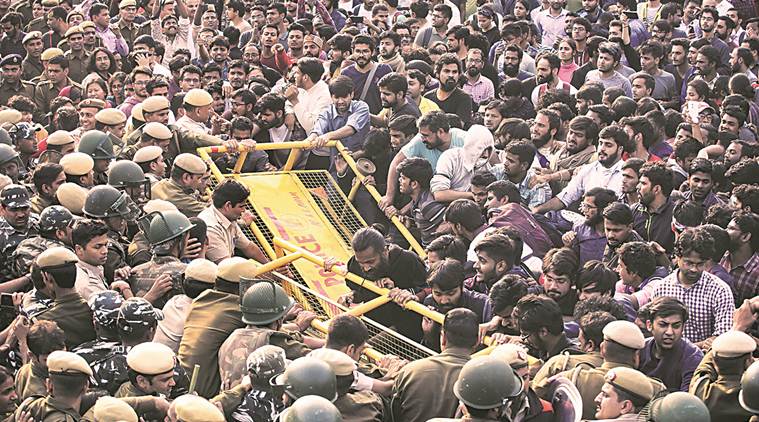The government is learned to have proposed a compromise formula to the university over the weekend. The ministry is now waiting to hear back from JNU.
The Human Resource Development (HRD) Ministry has advised the Jawaharlal Nehru University (JNU) administration to notify the students’ union and withdraw the police complaint against students as the first step to end the standoff at the university.
The government is learned to have proposed a compromise formula to the university over the weekend. The ministry is now waiting to hear back from JNU.
The notification of JNUSU and withdrawal of police complaints are part of the compromise formula. If the university agrees, the government expects the students to call off the agitation, to not “gherao” JNU officials, and to commit to a “dialogue” with the university.
According to government sources, the notification of the students’ union should not be a problem since the Delhi High Court has already permitted the election committee of JNUSU to declare the results of the union elections, which implies it had found no violation of the recommendations of the Lyngdoh Committee.
The government has advised the withdrawal of police cases as it feels an atmosphere of confrontation will not help resolve the standoff. Last month, the Delhi Police had registered an FIR in connection with the “vandalism” at the university’s administration block by the students.
This is the first intervention by the government after the high-powered committee (HPC) submitted its report on November 26. The committee, which was set up to suggest ways to end the standoff over the increase in hostel fees, had suggested that the University Grants Commission (UGC) should release extra funds for JNU to tide over its cash crunch, and that the university should increase fees only after consulting all stakeholders.
The main reason for the students’ protest is the introduction of service charges — for maintenance, mess workers, cook and sanitation — and utility charges (power and water consumption), which were so far not included in the hostel fee.
Opinion | JNU is a one-of-a-kind post-graduate university. That is also why it is being targeted
The rent for a single room has been increased from Rs 20 per month to Rs 600 per month, and for a double-sharing room from Rs 10 per month to Rs 300 per month.
Since the fee hike was officially passed and the student community erupted in protest, JNU has announced two partial rollbacks.
It first announced a 50% concession in room rent, utility and service charges for students below the poverty line (BPL). However, the administration is yet to clarify which students will be categorised as BPL.
As part of the second partial rollback, JNU announced a 50% reduction in service and utility charges for all students — from Rs 2,000 per month to Rs 1,000. It also announced a 75% reduction in utility and service charges for all eligible BPL (below poverty line) students, which would now be Rs 500 instead of Rs 2,000 per month.
The students, however, have continued to demand a complete rollback, and that the university administration should consult them before implementing any such increase in the future.
The government has proposed a compromise days before the semester-end examinations are scheduled to begin. The students general body had given a call to boycott the examination until the standoff was resolved.
For all the latest Education News, download Indian Express App
Source: Read Full Article





